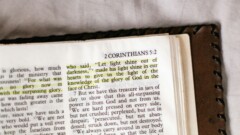It’s Thursday again, which means we’re continuing our reading through The Bruised Reed by Richard Sibbes. We are quickly drawing near to the end of this book–something that happens quickly when reading two chapters at a time. Another two or three weeks and we will be finished.
Summary
For some reason I found both of this week’s chapters more difficult than the ones that had come before. Somehow they seemed just a little bit less clear in their purpose. I’m guessing the fault is with me more than with Sibbes. Nevertheless, I did find it quite tough to orient myself.
In the first chapter Sibbes writes about people who offend Christ by in some way thinking little of his mercy. So he points to those who have a false despair of Christ’s mercy, those who have a false hope of his mercy, those who resist Christ’s mercy, those who presume upon that mercy, those who seek another source of mercy, those who mistreat the heirs of mercy, those who cause strife among the heirs of mercy, those who take advantage of the bruised and, finally, those who despise Christ’s simple means of mercy.
In the explanation of those who resist Christ’s mercy, this brief passage stood out to me: “There are those who take it on themselves to cast water on those sparks which Christ labors to kindle in them, because they will not be troubled with the light of them. Such must know that the Lamb can be angry, and that they who will not come under his scepter of mercy shall be crushed in pieces by his scepter of power.” And in Sibbes’ discussion of presuming upon Christ’s mercy, these words seemed particularly noteworthy: “Let us remember that grace is increased, in the exercise of it, not by virtue of the exercise itself, but as Christ by his Spirit flows into the soul and brings us nearer to himself, the fountain, so installing such comfort that the heart is further enlarged.”
And, as another one of Sibbes’ great little quotes, I had to highlight this: “The lower Christ comes down to us, the higher let us lift him up in our hearts.”
Chapter 11 looks to “Christ’s Judgment and Victory” and, as such, is the beginning of the end–the beginning of Sibbes’ look at the last part of the text which says that Christ will bring forth “judgment unto victory.” Sibbes says that the judgment the text speaks of is “the kingdom of grace in us, that government whereby Christ sets up a throne in our hearts.” “The meaning then is that the gracious frame of holiness set up in our hearts by the Spirit of Christ shall go forward until all contrary power is subdued.” He simply begins to explain the text, speaking of Christ’s mildness and his government, showing that pardon must always lead to obedience (“Only those that will take his yoke and count it a greater happiness to be under his government than to enjoy any liberty of the flesh.”) and explaining that justification leads to santification (“He is our Sanctifier as well as our Saviour, our Saviour as well by the effectual power of his Spirit from the power of sin as by the merit of his death from the guilt thereof.”).
I am hoping that some of you who read this will have brilliant things to say about it because, frankly, I feel like I’ve got little to say that would be of any real value!
Next Week
For next Thursday please read chapters 12 and 13.
Your Turn
The purpose of this program is to read classics together. So if there are things that stood out to you in this chapter, if there are questions you had, this is the time and place to have your say. Feel free to post a comment below or to link to your blog if you’ve chosen to write about this on your own site.










